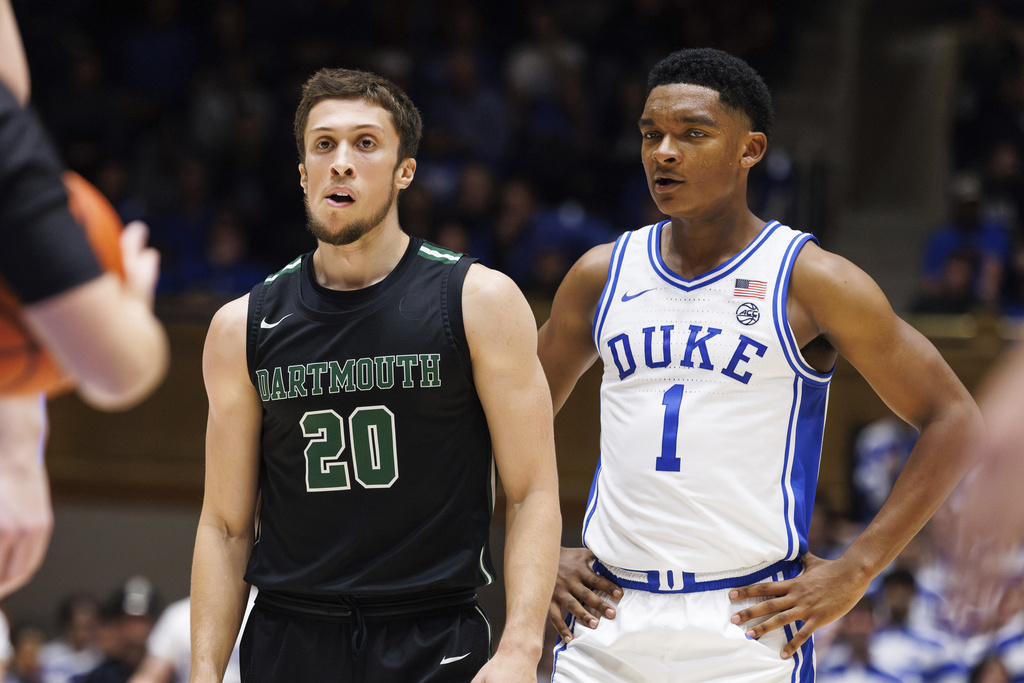Dartmouth men’s basketball team votes to unionize, though steps remain before forming labor union
HANOVER, N.H. (AP) — The Dartmouth men’s basketball team voted to unionize Tuesday in an unprecedented step toward forming the first labor union for college athletes and another attack on the NCAA’s deteriorating amateur business model.
In an election supervised by the National Labor Relations Board in the school’s Human Resources offices, the players voted 13-2 to join Service Employees International Union Local 560, which already represents some Dartmouth workers. Every player on the roster participated.
“Today is a big day for our team,” players Cade Haskins and Romeo Myrthil said in a statement. “We stuck together all season and won this election. It is self-evident that we, as students, can also be both campus workers and union members. Dartmouth seems to be stuck in the past. It’s time for the age of amateurism to end.”
The school has five business days to file an objection to the NLRB and could also take the matter to federal court. That could delay negotiations over a collective bargaining agreement until long after the current members of the basketball team have graduated.
Dartmouth pushed back on the decision — again — in a statement, saying it was supportive of the five unions it negotiates with on campus, including SEIU Local 560.
“In this isolated circumstance, however, the students on the men’s basketball team are not in any way employed by Dartmouth,” the school said. “For Ivy League students who are varsity athletes, academics are of primary importance, and athletic pursuit is part of the educational experience. Classifying these students as employees simply because they play basketball is as unprecedented as it is inaccurate. We, therefore, do not believe unionization is appropriate.”
Although the NCAA has long maintained that its players are “student-athletes” who were in school primarily to study, college sports has grown into a multibillion-dollar industry that richly rewards coaches and schools while the players remained unpaid amateurs.
Recent court decisions have chipped away at that framework, with players now allowed to profit off their name, image and likeness and earn a still-limited stipend for living expenses beyond the cost of attendance. Last month’s decision by an NLRB that the Big Green players are employees of the school, with the right to form a union, threatens to upend the amateur model.
“We will continue to talk to other athletes at Dartmouth and throughout the Ivy League about forming unions and working together to advocate for athletes’ rights and well-being,” Haskins and Myrthil said.
A college athletes union would be unprecedented in American sports. A previous attempt to unionize the Northwestern football team failed because the teams Wildcats play in the Big Ten, which includes public schools that aren’t under the jurisdiction of the NLRB.
That’s why one of the NCAA’s biggest threats isn’t coming in one of the big-money football programs like Alabama or Michigan, which are largely indistinguishable from professional sports teams. Instead, it is the academically oriented Ivy League, where players don’t receive athletic scholarships, teams play in sparsely filled gymnasiums and the games are streamed online instead of broadcast on network TV.
Myrthil and Haskins have said they would like to form an Ivy League Players Association that would include athletes from other sports on campus and other schools in the conference. They said they understood that change could come too late to benefit them and their current teammates.
The team includes four seniors, five juniors, three sophomores and three freshman.
“We have teammates here that we all love and support,” Myrthil said after playing at Harvard last month in the Big Green’s first game after the NLRB official’s ruling. “And whoever comes into the Dartmouth family is part of our family. So, we’ll support them as much as we can.”
Mary Kay Henry, the international president of the SEIU, said the players “will go down as one of the greatest basketball teams in all of history.”
“The Ivy League is where the whole scandalous model of nearly free labor in college sports was born and that is where it is going to die,” she said.
___
Jimmy Golen covers sports and the law for The Associated Press.
___
AP college basketball: https://apnews.com/hub/ap-top-25-college-basketball-poll and https://apnews.com/hub/college-basketball
